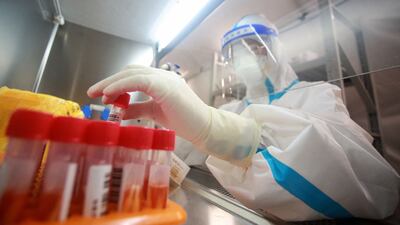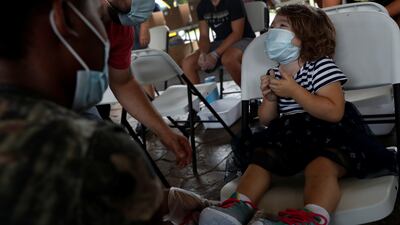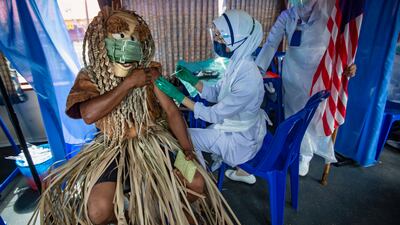The experience of a woman who tested positive for Covid-19 twice in three weeks has underlined the importance of guarding against complacency after infection, researchers who studied her case said.
The healthcare worker, 31, tested positive on a PCR on December 20, 2021, 12 days after receiving a booster shot.
She was asymptomatic at the time and remained so throughout the infection.
But on January 10 she began to feel unwell with a cough and fever. She took another PCR test, which was positive.
Genome sequencing performed on the samples showed she had been infected by different variants, researchers behind the study in Spain said.
The first infection in late December was due to the Delta variant. And the second, in January, was due to Omicron, which went on to become dominant worldwide.
Although considered milder than previous variants, it can evade previous immunity and is more infectious.
Researchers behind the study said the case highlighted the ability of Omicron to evade antibodies generated by vaccines and previous infections.
Infection no guarantee of protection from virus
“In other words, people who have had Covid-19 cannot assume they are protected against reinfection, even if they have been fully vaccinated,” said Dr Gemma Recio, of Institut Catala de Salut, Tarragona, Spain.
“Nevertheless, both previous infection with other variants and vaccination do seem to partially protect against severe disease and hospitalisation in those with Omicron.
“This case also underscores the need to carry out genomic surveillance of viruses in infections in those who are fully vaccinated and in reinfections.
“Such monitoring will help detect variants with the ability to partially evade the immune response.”
Reinfections rise sharply in UK
Many countries, such as the UK, only count reinfections after 90 days.
But they are fairly common, representing one in 10 Covid-19 cases in England in early April, 2022, the Office for National Statistics (ONS) said.
Half of all reinfections in the UK have occurred since December 1, suggesting the risk rose substantially with Omicron.
Primary infections after vaccination against Covid-19 are milder than in people who have not had a shot.
For that reason, it is reasonable to assume that, in general, “reinfections should be less severe than primary infections, as the person being reinfected will have some pre-existing immunity from their primary infection,” says an information page on reinfections by Gavi, the vaccine alliance.
But whether a person develops more or fewer symptoms during reinfection depends on a number of factors, including the waning of immunity and the variant in question.
The ONS says only 20 per cent of people reinfected with Alpha showed symptoms. With Delta it was 44 per cent and when it came to infections with Omicron, 46 per cent of people developed symptoms.
The data revealed people reinfected with Alpha were much less likely to have symptoms the second time compared to their primary infection.
“Whereas Delta reinfections were somewhat more likely to give people symptoms compared to their primary infection,” Gavi said.
“With an Omicron reinfection, the rate of symptoms was about the same across the reinfection and primary infection.”
In one study of Omicron infection and reinfection in an American household cited by the CDC and Gavi, one unvaccinated person caught the virus for the first time and four unvaccinated people for the second.
The severity of the illness was worse for the person who caught it for the first time, compared to those who were reinfected with Omicron.
“On the other hand, there have been opposing reports in the past of more severe disease being caused by reinfection,” said Gavi.
“So, while it’s plausible that reinfections should be milder, at the moment, we’re still lacking robust evidence that proves this.”
Factors such as viral load may also play a role, with many studies having previously shown a higher initial dose of the virus leads to more severe symptoms.




















